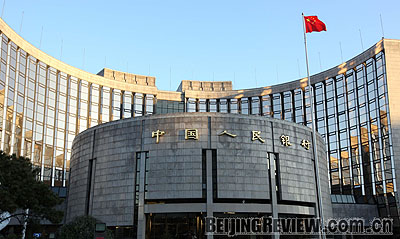| Numbers of the Week
640 million
China's credit database contained the records of 640 million people at the end of 2008, an increase of 40 million from a year earlier, according to the People's Bank of China, the central bank.
189.96 billion
China's advertising industry raked in total revenue of 189.96 billion yuan ($27.78 billion) in 2008, an increase of 9.11 percent year on year, according to the State Administration for Industry and Commerce.

TO THE POINT: The Ministry of Finance issued details about the upcoming provincial government bond issue as part of its economic stimulus efforts. The Ministry of Commerce rejected Coca-Cola's cash bid for domestic juice maker Huiyuan on monopolistic grounds. Running the same risk was Chinalco, which faces a longer regulatory review by Australian government officials in its pursuit of mining company Rio Tinto. In February, China's FDI dropped nearly 16 percent year on year, marking a slowdown from an almost 33-percent drop in January. The World Bank revised its forecast for China's economic growth in 2009.
By HU YUE
Bonds on the Way
Bonds to be issued by provincial governments this year can be traded on the interbank market and the stock exchanges, the Ministry of Finance said on March 17.
Earlier this month, the ministry announced a plan to issue 200-billion-yuan ($29.3 billion) worth of three-year bonds on behalf of local governments to finance a variety of projects as part of its economic revitalization efforts.
The bonds' coupon amounts will be determined through market bidding, the ministry said.
"The bond sale aims to consolidate the country's fiscal foundation, which has shown signs of shakiness," the ministry said. "The raised funds will mostly go to affordable housing projects, rural infrastructure, health care, education and environmental protection, as well as reconstruction of quake-stricken areas."
In distributing the funds, the ministry said it also would focus on the country's underdeveloped central and western provinces where fresh capital is badly needed.
Coke Deal Blocked
After six months of waiting, Coca-Cola Co. finally received word from China's Ministry of Commerce (MOFCOM) that it rejected the American beverage maker's $2.4-billion offer to buy Huiyuan Juice Group Ltd., the country's top juice maker.
On March 18, MOFCOM officially rejected Coca-Cola's offer because of monopoly concerns, pouring cold water on the beverage giant's expansion plans in China. The proposed acquisition would have been the largest foreign takeover of a domestic firm.
Coca-Cola offered a substantial premium for Hong Kong-listed Huiyuan on September 3, 2008, and submitted an application to MOFCOM for an antitrust review on September 18. It had reportedly pinned hopes on the deal to make a push into China's booming soft drink market. Earlier this month, Coca-Cola also made known a plan to invest more than $2 billion in China over the next three years.
But the deal had sparked a backlash among domestic consumers calling for the protection of Huiyuan as a national brand. Meanwhile, a number of domestic juice makers also have publicly voiced their opposition to the deal, citing Coca-Cola's potential ability to dominate China's soft drink market.
If approved, the deal would have given Coca-Cola a dominant position in the soft drinks sector, said MOFCOM. Moreover, it would have squeezed the living space of many smaller juice producers and hampered market competition. This is the first blocked takeover bid since the country's Anti-monopoly Law came into force last August.
Analysts believe the deal's rejection is good news for domestic juice brands, especially small and medium-sized ones. They also said it was not entirely bad news for Coca-Cola, because Huiyuan's underlying value was not worth the premium that Coca-Cola offered.
Both Coca-Cola and Huiyuan responded to the rejection, saying they respect the ministry's decision. Coca-Cola said in a statement that it was disappointed, but still committed to the Chinese market.
FDI Decline Slows
China's foreign direct investment (FDI) dropped by 15.81 percent year on year in February to $5.83 billion, according to the MOFCOM.
This was the fifth consecutive month that witnessed a decline in FDI, but the pace was much milder as compared with January in which FDI fell nearly 33 percent.
The latest figure signals a recovery in the country's investment environment and China's strong attractiveness as an investment destination despite the economic downturn, said MOFCOM Spokesman Yao Jian at a press conference on March 16.
The improvement has come largely because of the government's aggressive measures to shake off recessionary pressure and restore foreign investors' confidence, Yao added.
In its latest move to help Chinese companies deal with the investment gloom, MOFCOM announced on March 12 that it would grant its local offices a greater say on approving foreign-funded projects.
| 